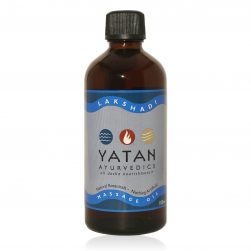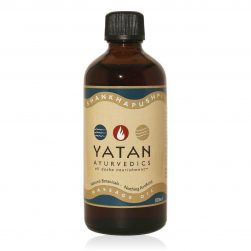What is Eczema?
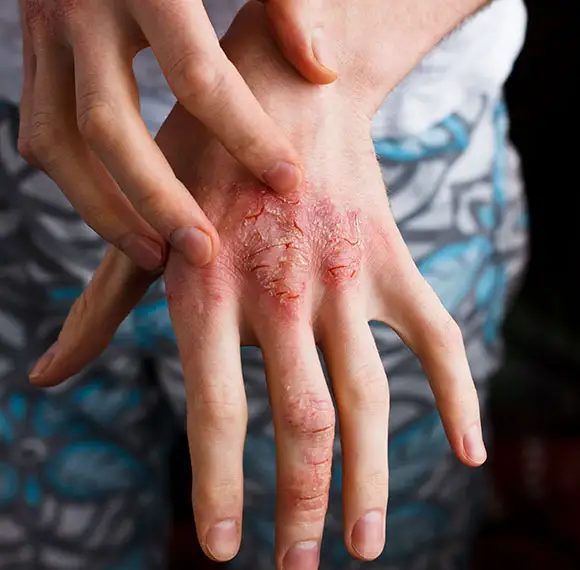
Eczema, also known as “dermatitis”, is an inflammation of the skin caused by an overreaction of your body to an environmental factor.
It is a condition where one has extremely dry, itchy, cracked and flaky skin.In more severe cases, the eczema patches can become crusty and ooze pus or blood.
Skin folds and exposed skin surfaces are more prone to eczema than other parts of the body. This means that you are more likely to notice eczema lesions inside of the elbows, at the creases of your wrists, your armpits, the backs of your knees, or exposed skin surfaces (face, hands and feet).
Eczema is most commonly seen in children. However, this is more of an observation than a rule because eczema can occur at any age.
Eczema is not caused by any known virus, fungi or bacteria. This means that it is not contagious.
What are the common symptoms of eczema?
The most common symptoms of eczema are red, dry, flaky and itchy skin.
In mild eczema, the skin is only dry and flaky. There is no pain, pus or bleeding.
The skin can bleed or become infected when the eczema becomes more severe. If it becomes infected it will begin to ooze pus.
What is Eczema from an Ayurvedic Perspective?
In Ayurveda, we view eczema as a Dosha imbalance.
What are the Dosha energies?
The three Dosha energies in Ayurveda are the Pitta, Vata and Kapha. They are the energies that run through our bodies. These energies correspond to the natural elements found on earth. Since our body is a natural phenomenon, it must be regulated by elements found in nature.
 Pitta Dosha
Pitta Dosha
Pitta Dosha is the fire energy. It regulates how much heat our body produces.
Inflammation can result when the Pitta Dosha is not in balance.
Where there is inflammation, there is excessive heat. If you touch an inflamed part of your skin, you will notice that it feels hot.
The physical manifestations of eczema are due to a Pitta energyimbalance.
A Pitta dominanteczema appears very bright red.
 Vata Dosha
Vata Dosha
Vata Dosha is our body’s wind energy. Vata is the energy that enablesquick but controlled movements of the body.
A Vata Dosha imbalance leads to uncontrolled bodily movements, as well as the uncontrolled movement of materials throughout the body.
An accumulation of Vata can lead to the sensation of pain.
A Vatadominanteczema appears pinkish. It can be dry, flaky or cracked. This type ofeczema can feel very itchy or painful.
 Kapha Dosha
Kapha Dosha
Kapha Dosha is the water Dosha. Kapha Dosha acts as a lubricant. It helps to keep substances moving smoothly through the body.
When Kapha is out of balance, movement of substances can slow down. A slow moving Kapha can lead to the formation of sticky plugs in the body. This results in the accumulation of cellular wastes, as well as nutrients not being delivered to the cells.
When Pitta or Vata become aggravated, your body may begin producing more Kapha in an attempt to subdue the other two energies. However, this may lead to an overproduction of Kapha.
When too much Kapha is produced, the body may become more acidic. Microorganisms grow well in an acidic environment, therefore the Kapha aggravated body is also more prone to infections.
If the eczema is Kapha dominant, the skin can become infected very quickly. The infected areas can begin to ooze a watery substance and become even itchier. The body may start to form pus. Western medical doctors may treat this with antibiotic/steroid creams or ointments. However, an ayurvedic treatment for eczema focuses on balancing the doshas of an individual.
How does a Pitta Dosha imbalance cause eczema?
The symptoms of eczema are almost always produced by Pitta Dosha imbalance. However, all three Dosha’s can be out of balance in a single case ofeczema. The underlyingDosha imbalance that resulted in the eczema varies from person to person.
The Pitta dominant eczema presents with skin that is red, dry, cracked, itchy or painful. The skin can easily bleed when scratched or it can become infected and ooze pus.
Cold pulse, excess Pitta.
Some individuals may have excess Pitta (heat), but a cold pulse. This often causes some confusion as to the cause of the eczema, but there is a very simple explanation.
When a person has a cold pulse, it means that they have less fire or heat. The body attempts to compensate for this by increasing Pitta (heat) production.
Sometimes the body can forget how to evenly distribute thePitta. Some areas of the body receive more Pitta and others receive very little. When this happens, the entire body feels cool; but some areas are red, hot and inflamed. These inflamed areas on the skin are what we call eczema.
Another explanation for the presence of eczema with a cold pulse is that it may be a malfunction of the Pitta system.
Channels and microvessels may become blocked when an insufficient amount of Pitta is produced. This is because Pitta helps to melt any blockages that may have been caused by an accumulation of Kapha. If too little Pitta is produced, the sticky Kapha blockages remain. The result is that heat cannot be evenly distributed throughout the body. This leads to some parts of the body receiving too much heat and other parts receiving too little heat.
This can be a dangerous situation because the body needs Pitta and its heat production to survive.
Emergency adrenal heat production.
The body has a backup system that produces heat when the Pitta becomes imbalanced. This backup system is the adrenal glands. They are only used in emergency situations as a back-up heat production mechanism.
Unfortunately, the adrenal glands do not have the ability to analyze the situation and decide what the optimal amount of heat they need to produce is. Therefore, they are unable to regulate heat production. They usually overproduce heat, and this starts to damage the body. When this damage manifests on the skin, it can physically manifest as a severe form of eczema.
The emergency adrenal heat production system is similar to a shortage in the fuse of a house electrical system. When there is a shortage, the electricity may go out. When it returns, it can return in an uncontrolled surge. This surge can be so high that it may potentially damage anything that was plugged into an electrical outlet at the time.
Similarly, the adrenals produce a heat surge. It can be too much for the body to handle effectively.
When multiple Dosha’s become unbalanced.
It is very important to note that eczema can result from the imbalance of multipleDosha’s. When this happens, the eczema is usually more severeand more difficult to treat.
During the eczema treatment in Ayurveda, we look at the body as a whole. We examine the function of all of the Dosha’s. We then provide guidance, advice, yoga and medicine to balance the body.
What are the different types of eczema and how do they differ?
All of the different types of eczema are the result of a systemic or local Pitta aggravation. They all manifest with an inflammation of the skin. We can help you identify the dosha imbalance when you visit us for an ayurvedic treatment for eczema.
They differ in the symptoms a person experiences as well as the location on the skin where the eczema manifests.
The different types of eczema are:
- Atopic Dermatitis: This is the most common type of eczema. It most commonly occurs in children; however, it can be seen in adults as well. It is the result of a hypersensitivity (or allergy). This type of eczema is the brother of asthma and allergy, when one is present the other two are likely to manifest at some point as well.
- Contact Dermatitis: This type of eczema is a local allergic reaction to a specific allergen that your skin comes into contact with. Only the area that comes into contact with the allergen develops eczema. An example of this is eczema that develops only under the arms due to contact with sweat.
- Dyshidrotic Eczema: This is another type of eczema that is localized to a specific part of the body. Dyshidrotic eczema usually occurs on hands and feet. It starts out as small, water-filled blisters. These blisters can be extremely itchy and painful. It can get infected or spread if it is left untreated.
- Nummular Eczema: This is a ring-like lesion that can appear on the legs, torso, feet or hands. This skin lesion is extremely red, painful and itchy. It is prone to bleeding.
- Seborrheic Dermatitis: The skin in this type of eczema is red, itchy, painful, scaly and greasy looking. This type of eczema tends to affect areas that are rich in oil producing glands, such as the face and head. In babies, it is called “cradle cap”. If the scalp is involved, the patient may have dandruff.
- Stasis Dermatitis: This type of eczema is common in patients that have varicose veins, or venous insufficiency. It is most common on the lower part of the legs, where blood tends to pool in venous insufficiency. It tends to flare up in the summer, producing extremely itchy or painful skin. These lesions have a tendency to bleed.
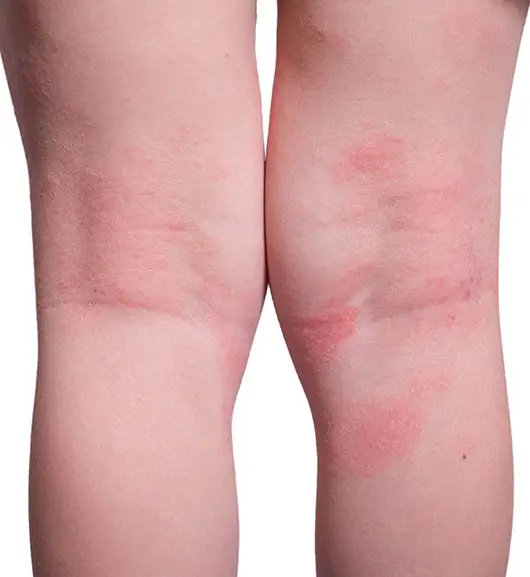
Why does eczema occur?
The main cause of eczema is a Dosha imbalance. Pitta is the main Dosha responsible for eczema.
The Pitta imbalance can be due to a very low or very high Pitta production. If Pitta production is very low, it can activate emergency adrenal heat production. This leads to excess production of heat even though Pitta may be very low.
Eczema can also occur in people who are sensitive to environmental allergens such as pollen. This is why allergy, asthma and eczema can often be present in the same person. They might not be present at the same time, but a person that has allergies or asthma is also more prone to developing eczema, and vice versa.
The final potential cause of eczema is a toxin overload. This can happen when the kidneys do not properly purify the blood. The toxin deposits in random parts of the body. When it deposits in the skin, it can create eczema. In this case, the type of eczema that it creates depends on the type of toxin as well as where it deposits.
What type of person is most likely to be affected by eczema?
There are several types of people that may develop eczema:
- A Pitta Dosha dominant person, or someone with a Pitta imbalance. This type of person is more prone to eczema because of excessive systemic Pitta.
- A person who currently has or has had asthma.
- A person with allergies.
- Somebody who already has another skin condition.
- A person with long standing digestive problems.
- Somebody who lacks certain digestive enzymes. This is because their body cannot breakdown everything they eat. The byproducts of the undigested foods begin to flow in the body channels and trigger eczema.
- Very emotional individuals. When a person becomes very emotional, this can trigger certain substances in their body that may lead to eczema. Specifically, when a person is stressed their body produces more cortisol. Cortisol can create a more acidic environment in the body. Therefore, a person’s thoughts can influence their physiology.
What are the risk factors for developing eczema?
The first important risk factor for developing eczema is any long-standing health condition. As mentioned earlier, long-standing digestive issues specifically can trigger eczema in a person that is prone to it.
A second important risk factor for eczema is a very emotional or irritable person. The person may feel upset, like they cannot calm down. They may have sleep disturbances. When they are with people, they may start to feel itchy and experience negative emotions. If they are with a group of people or at a special meeting, they may begin to feel so itchy that they cannot sit.
What is the Ayurvedic approach to the treatment of eczema?
The Ayurvedic treatment for eczema includes:
- Diet plan
- Stress management plan
- Yoga postures to activate certain body centers
- Ayurvedic medicines to balance the body
- Analysis and balancing of Dosha’s
Diet plan for the treatment of eczema.
The specific diet for the eczema treatment in Ayurveda does not take into account macronutrients such as
proteins, carbohydrates and fats. The Ayurvedic diet plan focuses on eliminating foods that aggravate eczema.
The Ayurvedic practitioner analyzes your specific case and removes food from your diet that may aggravate your eczema or foods that you may not have enzymes to break down.
For example, the Ayurveda practitioner may recommend that you stop eating oranges, mandarins, pineapples and tomatoes as they aggravate eczema. This does not mean that you will never be able to eat those foods again. You may slowly start adding restricted foods back into your diet once your eczema has healed.
Yoga and medicine for the treatment of eczema.
Ayurvedic medicine works well on its own to clear up the symptoms of eczema. However, the health benefits are increased, and results are seen faster when it is combined with a yoga practice.
We recommend certain types of yoga as an added treatment for eczema, specifically:
- Yoga mudra
- Ujjayi pranayama
- Yatan yoga
Please refer to our YATAN Yoga Therapy book for more on yoga as therapy.
How is the Ayurvedic approach to the treatment of eczema different from the Western medical approach?
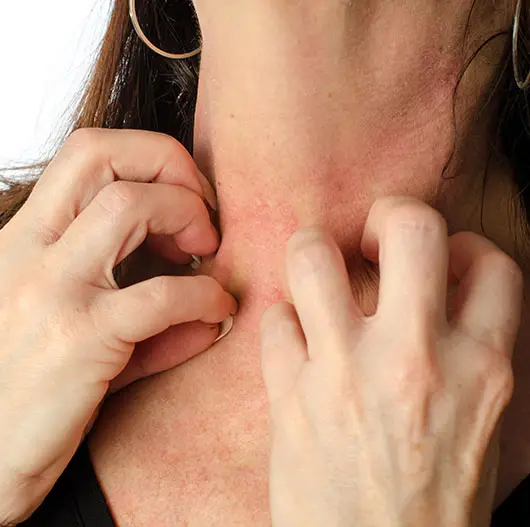
The main difference in Ayurvedic treatment for eczema and Western medical approach is that the Ayurvedic approach recognizes that eczema is a symptom of a systemic problem, whereas the Western medical approach treats only the symptoms of eczema.
In Ayurveda, we attempt to balance the health of the body as a whole, including the digestion. We consider all of the factors that may have triggered the eczema.
The first thing we do is resolve the itching in eczema. This is because itching leads to scratching of skin, which can potentially lead to the formation of scars. When the skin has scarred, we require a different Ayurvedic program to fix the skin discoloration. It can take up to one year after eczema treatment for discolored patches of skin to clear up.
Ayurvedic eczema medicationis tailored to what your particular case requires. It can be ingested or topical. We have a selection of oils, creams and ingestible medication that aim to balance the Pitta.
It is important to note that Ayurvedic medicine is not made according to the type of eczema you have. We chose the medicine based on how to best detoxify your body to help heal the eczema.
For this reason, one type of medicine may be used for many different eczema types. The medicine is chosen based on what the underlying problem is. Our aim is to heal the causes creating your eczema, not merely mask it with immune suppressing creams (eg. Steroid creams).
What is the benefit of the Ayurvedic approach and why should I try this route of treatment for my eczema?
The main benefit of the Ayurvedic approach to eczema treatment is that we focus on improving your overall health. This is our approach to the treatment of any disease.
Since eczema is a sign of an imbalance in other body systems, improvement of the eczema results in an improvement of the whole body. For this reason, you will have a general improvement of your wellbeing.
The step-by-step Ayurvedic approach to the treatment of eczema.
Our approach to the eczema treatment in ayurveda is fairly simple, that is why it is effective.
Our first step is always to analyze your Doshas. In this way we are able to assess what Doshas are aggravated in your particular case. This also gives us an opportunity to examine your body function as a whole. It helps us to determine if your digestion or prior asthma may have played a role in you developing eczema. It also allows us to review any medication or vitamins you may be taking, sometimes they may cause a very dry type of eczema.
Our next step is to advise you according to our findings. Since climate can affect how well certain therapies work, we must prescribe the treatment based on your geographic location and climate.
For example, in a hot climate one may develop eczema as a reaction to their own sweat. Your body is melting toxins as it becomes hot and sweats. Unfortunately, those toxins can cause sweat to become acidic and when they linger on your skin they can act as an irritant.
The final step is to follow your progress as you go through the treatment and as your health improves. At this point, your therapy may require an adjustment based on the changing needs of your body. We are with you every step of the way.
How you can prevent eczema from developing.
Eczema flares can be prevented by balancing the Doshas, following appropriate dietary advice and being vigilant about stress management.
Eczema is not the underlying problem. Eczema is the physical manifestation of an underlying problem that may be due to a malfunction of multiple factors. We must consider all of this when treating eczema.
Sometimes, the main cause of an eczema flare is negative emotion, including stress at work or in your personal life. In this case, you must first manage your stress and nutrition. Only after that can we balance your Doshas.
Another possible point of eczema prevention is a balanced gut flora. Ayurvedic medicine exists that is able to balance the gut to allow the gut flora to regenerate and flourish on its own.
We do not use probiotics to put new bacteria in. This is because even if you ingest fresh flora, and your gut is out of balance, this flora will not be able to flourish. In Ayurveda we balance the internal environment of the gut so that good gut flora can flourish. Otherwise, any fresh flora you ingest via probiotic will not survive.
How much does eczema treatment cost?
As mentioned earlier, the actual treatment of eczema is highly individual. We must consider what your body needs before we know what steps we can take in order to help it.
This means that the cost of ayurvedic treatment for eczema is also highly individual. It can only be determined after a thorough examination of your body’s needs. We look at your body as a whole system and not a single problem. We chose medicines to align your body and help it to function optimally. Only “treating eczema” does not work.
Please contact us for a thorough assessment of your eczema.
How long will it take to see the results of eczema treatment?
Most people can expect to see some improvement in their eczema symptoms within three weeks of starting treatment.
The time it takes to get full results from the Ayurvedic eczema treatment depends on your individual case and on how chronic and severe your eczema is.
There is no Ayurvedic medicine that works as an instant cure-all. We must focus on rebuilding and balancing your entire body system. Since eczema is often related to other factors, it may improve as the other factors improve. Then it may get a little worse, then improve again. It is important to understand that the road to improvement is not a straight line. There are always ups and downs. However overall, your physical, mental and emotional states will be consistently improving.
Related Products: Massage Oils.
The LakshadiAyurvedic Body Massage Oil may help to relieve eczema symptoms in mild disease. It may help to regulate the dryness, itching and redness.
Our Shankhpushpi Herbal Oil is another product that may help to soothe the dryness caused by eczema.
You may try these oils on your own if you have mild symptoms. However, it is always best to seek the advice of an Ayurveda practitioner before starting treatment in order to get the best results.
A testimonial from our practitioner, Raman Das Mahatyagi, using Ayurvedic medicine to treat his son’s eczema.
My son was born in 1999 and when he was one year old he developed eczema that spread over his entire body. I had not been in Australia for very long and was previously living in Nepal so I didn’t have much knowledge about the medical system here. My wife advised me that we should take our son to the doctor to get some treatment for him. The doctor prescribed a cortisone cream to apply to our son’s skin every time after washing. Initially the eczema cleared slightly but soon the cream became ineffective and so I decided to treat him with Ayurvedic formulas both internally and externally. Within 3-4 days the medicine started to take effect and I continued the treatment for the next 2 months by which time his skin was clear. Since then I have only given him medicine occasionally when he needs it.
How can I book a consultation?
Foods to avoid for eczema
Individuals with eczema may consider limiting or avoiding certain foods that could potentially trigger or worsen their symptoms. Some foods that are commonly recommended to be avoided for eczema include fermented food items, an excess of salt and sugar, alcohol, sour fruits, processed foods, caffeine and dry nuts.
To determine the most suitable foods to avoid for your eczema condition, it’s recommended to undergo a thorough dosha assessment and collaborate with an Ayurvedic practitioner to develop a personalised diet plan for eczema.
What are the causes of eczema in adults?
The causes of eczema in adults may depend on varying factors which may include:
Genetics: A family history of eczema, allergies, or asthma can increase the chances of eczema.
Environmental Factors: An overexposure to skin irritants like harsh soaps, detergents, fragrances, and chemicals can trigger or aggravate eczema symptoms.
Emotional Stress: You may experience eczema flare-ups more frequently if you have high levels of stress and anxiety.
Compromised Skin Barrier: A weakened skin barrier allows irritants, allergens, and moisture to penetrate more easily, leading to inflammation and itching thereby flaring up eczema.
Home remedies for eczema
While there is no one-size-fits-all solution for eczema, some people find relief from their symptoms by using various home remedies.
Gentle Oil Massage: Oils like Lakshadi Ayurvedic Body Massage Oil may help to relieve eczema symptoms in mild disease.
Aloe vera gel: Apply aloe vera gel free from artificial fragrance and colours.
Anti Inflammatory herbs: You may include anti inflammatory herbs like triphala or shatavari which may help with your inflammation.
NOTE: it is important to remember that what may work for one person may not work for others and vice-versa and it’s always a good idea to speak with an ayurvedic practitioner before attempting any new remedies.
For more eczema information please visit our other blog posts:
Schedule Your Free 10-Minute Consultation
*Discover holistic healing with a complimentary phone or video consultation from our expert Ayurvedic practitioner. Start your path to better health today!*





















